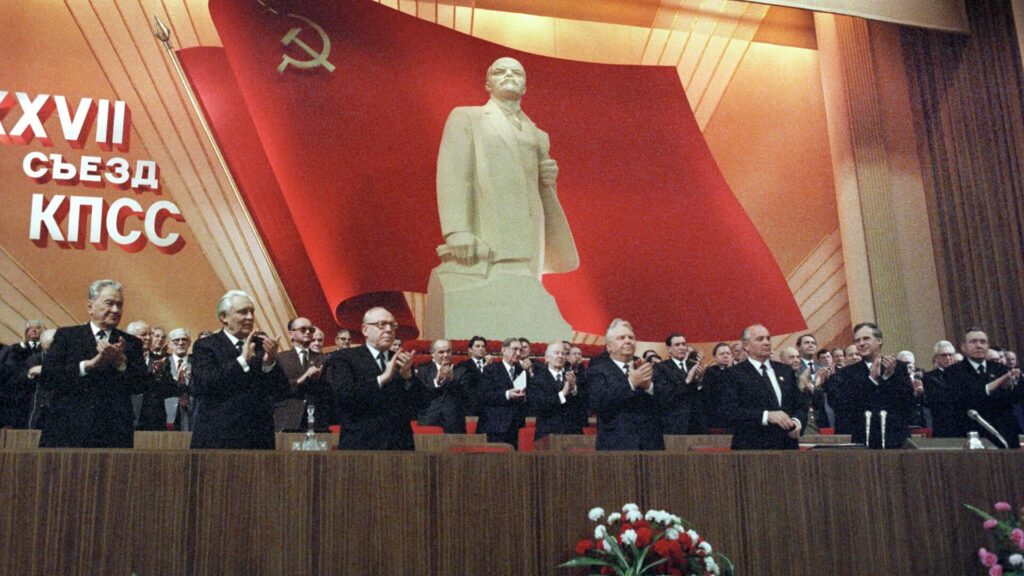CPSU History: We Should Constantly Analyze and Learn From The Error in the guiding ideology of the Soviet Communist Party

Authors: Author Yuan Bingda is a professor at the Party School of the Shanghai Municipal Committee of the Communist Party of China; Chen Chao is an associate professor at the Party School of the Songjiang District Committee of the Communist Party of China in Shanghai; Wang Cuiping is an associate professor at the Party School of the Pudong New Area Committee of the Communist Party of China in Shanghai; Wang Fang is a lecturer at the Party School of the Jingdezhen Municipal Committee of the Communist Party of China in Jiangxi Province
Taken from Communist Party Members Network
[Abstract] The key reason for the evolution of the Soviet Union is that after Stalin’s death, when the Soviet Union was facing an important historical juncture to solve the drawbacks of the “Stalin model”, the Soviet leaders from Khrushchev, Brezhnev to Gorbachev gradually abandoned the Marxist-Leninist guiding ideology, causing the party to lose its ideological and theoretical advancement and purity, thus leading to the collapse of the ruling party and the disintegration of the country. As early as 1956, the Communist Party of China began to be alert to the clues that the Soviet Communist Party’s guiding ideology had fallen into a misunderstanding. For a long time, the CPC Party Central Committee has always attached importance to learning from the profound lessons of the Soviet Communist Party’s guiding ideology mistakes, always holding high the great banner of Marxism-Leninism, and promoting the process of sinicization of Marxism. The valuable experience of the Communist Party of China’s guiding ideology keeping pace with the times has great and far-reaching significance.
I. The serious harm and profound lessons of the Soviet Communist Party’s guiding ideology falling into error
The October Revolution would not have been victorious without the guidance of Marxism-Leninism. Marxism-Leninism is the soul of the Bolshevik Party, the spiritual pillar of the masses, and the indispensable magic weapon for the Communist Party to govern. Khrushchev and his successors deviated from and then denied Marxism-Leninism, which led to ideological and theoretical confusion and social public opinion out of control, and eventually led to their downfall. This lesson is very painful.
Chapter 1. The main manifestations of the Soviet Communist Party’s guiding ideology falling into error
1. Theoretical error: rigid and dogmatic Marxism-Leninism.
From the late 1920s to the early 1930s, dogmatism gradually emerged within the CPSU. Stalin monopolized the right to interpret Leninism, generalized and deified Leninism, and made it dogmatic. At the same time, the CPSU combined dogmatism with personality cult. Stalin became the embodiment of the party and truth, and the “Stalin model” became a fixed model for socialist construction.
Although Khrushchev’s “secret report” lifted the lid on Stalin’s problems, because Khrushchev lacked the theoretical knowledge of Marxism-Leninism, he did not attach importance to the construction of the party’s guiding ideology, continued to promote a system of excessive concentration of power and a line of eager transition to communism, and dogmatic habits still permeated the party and theoretical circles.
After Brezhnev came to power, the rigid dogma of Brezhnevism was formed. The stagnation of the party’s guiding ideology caused the reform to lose its direction, the development to deviate from the road, and the governance to lose its foundation.
2. Ideological error: downplaying and instrumentalizing Marxism-Leninism.
Starting from the late 1950s, as the older generation of proletarian revolutionaries passed away one after another, most of the Soviet Communist Party Central Committee leaders came from the economic and organizational departments. They had low Marxist-Leninist theoretical literacy and their faith in Marxism was gradually looked down upon and even seen through. In March 1985, Gorbachev took over as General Secretary of the Soviet Communist Party Central Committee. Under the banner of “reform”, he gradually promoted “humane and democratic socialism”. [1] By 1991, the vast majority of Soviet people had undergone profound changes in their thinking. The Soviet Communist Party, Marxism-Leninism, and the socialist system had lost their prestige.
3. Party Conduct Error: weakening in the Belief of and nihilism Attitude towards Marxism-Leninism.
In 1956, Khrushchev made a “secret report” at the 20th Congress of the CPSU to launch the criticism of Stalin. Under Khrushchev’s instigation, the criticism of Stalin soon developed into a total negation of Stalin, leading to the disastrous consequences of serious ideological confusion in the Party and the people. Gorbachev, who called himself as the “child of the 20th Congress”, further promoted the comprehensive de-Marxist-Leninist movement within the Party and the country during his tenure. In 1989, the reform of political theory courses in Soviet universities almost completely abolished the teaching of Marxism-Leninism. The attitude of the “children of the 20th Congress” of the CPSU towards Marxism-Leninism will inevitably lead to the loss of Marxism-Leninism’s guiding position in the field of ideology.
Please Download for Full Text
